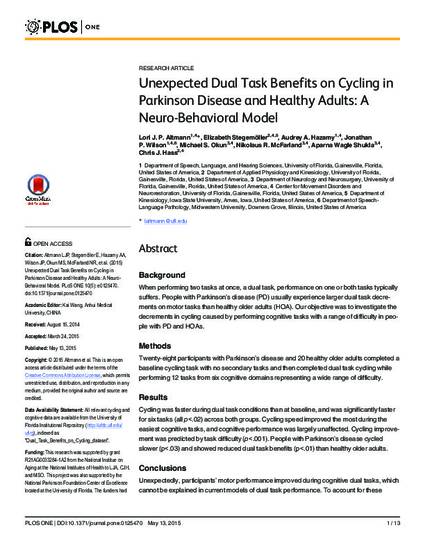
Background When performing two tasks at once, a dual task, performance on one or both tasks typically suffers. People with Parkinson’s disease (PD) usually experience larger dual task decrements on motor tasks than healthy older adults (HOA). Our objective was to investigate the decrements in cycling caused by performing cognitive tasks with a range of difficulty in people with PD and HOAs. Methods Twenty-eight participants with Parkinson’s disease and 20 healthy older adults completed a baseline cycling task with no secondary tasks and then completed dual task cycling while performing 12 tasks from six cognitive domains representing a wide range of difficulty. Results Cycling was faster during dual task conditions than at baseline, and was significantly faster for six tasks (all p<.02) across both groups. Cycling speed improved the most during the easiest cognitive tasks, and cognitive performance was largely unaffected. Cycling improvement was predicted by task difficulty (p<.001). People with Parkinson’s disease cycled slower (p<.03) and showed reduced dual task benefits (p<.01) than healthy older adults. Conclusions Unexpectedly, participants’ motor performance improved during cognitive dual tasks, which cannot be explained in current models of dual task performance. To account for these findings, we propose a model integrating dual task and acute exercise approaches which posits that cognitive arousal during dual tasks increases resources to facilitate motor and cognitive performance, which is subsequently modulated by motor and cognitive task difficulty. This model can explain both the improvement observed on dual tasks in the current study and more typical dual task findings in other studies.
Available at: http://works.bepress.com/elizabeth_stegemoller/3/
